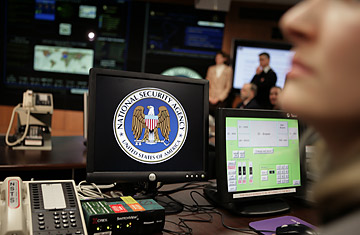
The National Security Agency logo appears on a computer screen inside the Threat Operations Center at the NSA in Fort Meade, Md.
If early last September you'd parked outside Lehman Brothers' Manhattan headquarters with a cell-phone scanner and listened only to some of the "chatter" coming out of Lehman's front office, you almost certainly would have realized that Lehman was going under. But to understand the wider consequences, how capitalism was about to do a somersault into the watery abyss, you would have needed to understand how Lehman fit into the global financial system. (Of course, listening to cell-phone conversations with a scanner in this country is flatly illegal. And you need a sophisticated decrypting device to listen to most cell-phone calls.)
But that's the thing about chatter: it usually makes sense only in context, when you have a lot of other information at your fingertips. (Watch TIME's video on the risks of chatter.)
Chatter is one of those floating espionage terms that can mean anything from secretly intercepted telephone calls and e-mails to the volume of communications traffic at a particular time over a particular line. A more technical definition of chatter might be the interception of any unguarded electronic communication between two people who expect privacy — people more likely to speak frankly and convey information they wouldn't in a public forum.
America's 16 intelligence agencies by and large consider chatter the most reliable intelligence there is. But they also need to constantly remind themselves that it is a blunt tool, often as confusing as it is illuminating. The day of the meltdown of the Chernobyl reactor in 1986, there was initially a sharp spike in Soviet message traffic. The intelligence community knew something bad had just happened. But what? The immediate speculation was a change of Soviet leadership or even a plane crash. It wasn't until more reporting emerged, including that by the media, that it was understood it was a nuclear accident.
The National Security Agency (NSA), which collects the vast bulk of chatter for this country, has no shortage of sophisticated equipment and no legal obstacles when it listens to chatter abroad. What it does have a problem with is making sense of the sea of chatter it sucks out of the air and the world's fiber-optic cables. The risk of misinterpretation or missing a vital piece of information is enormous. (See the top 10 Secret Service code names.)
There's also the problem that almost anyone who reads the news today knows that any phone conversation can be monitored, by the U.S. or another competent intelligence service. An operative recently back from Iraq tells me that Kurdish political leaders systematically script telephone conversations among themselves in order to mislead the Americans, Iranians and Turks, who the Kurds know are listening to their phone calls. Since transcripts of these calls carry the weight of scripture in Washington, we risk being led into another intelligence failure in Iraq. For that matter, how do we know that al-Qaeda in Pakistan's tribal areas is not transmitting spoofed messages as disinformation, causing our Predators to strike innocent targets with the purpose of turning the locals against us? (See pictures of the battle against the Taliban.)
The operative back from Iraq says the room for exploiting our gullibility when it comes to chatter is wide. "There is little understanding of deception in the agency anymore. As a service, it doesn't do deception operations and therefore doesn't believe they are run against us."
To understand just how misleading chatter can be, you have only to go back to Colin Powell's presentation at the United Nations in 2003, the one in which he incorrectly — if plausibly — claimed Saddam Hussein had held on to his weapons of mass destruction. Among other pieces of intelligence, Powell's case turned on an intercepted voice communication between two Iraqi officials. But as we now know, the two were only speculating — in complete ignorance.
Too bad Powell hadn't spent time working in intelligence. The first lesson any good intelligence officer will learn in the field is that chatter is a trap easily fallen into. When I was in the Middle East I'd sit down every so often with a commercially available Bearcat scanner and listen to random conversations. It was mostly people griping about the shortage of bread or the price of gasoline. I improved my Arabic but little more. Once, however, something very intriguing came up on the air: the movement of tanks out of barracks. I was elated, jumping to the conclusion that a coup d'état was in the offing — and I'd be the one to break the news to Washington. As it turned out, the tanks were getting ready for a military parade.
